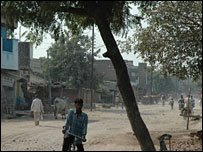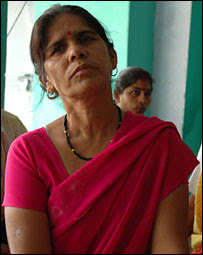BBC News, Banda
 They wear pink saris and go after corrupt officials and boorish men with sticks and axes.
They wear pink saris and go after corrupt officials and boorish men with sticks and axes.The several hundred vigilante women of India's northern Uttar Pradesh state's Banda area proudly call themselves the "gulabi gang" (pink gang), striking fear in the hearts of wrongdoers and earning the grudging respect of officials.
The pink women of Banda shun political parties and NGOs because, in the words of their feisty leader, Sampat Pal Devi, "they are always looking for kickbacks when they offer to fund us".
Two years after they gave themselves a name and an attire, the women in pink have thrashed men who have abandoned or beaten their wives and unearthed corruption in the distribution of grain to the poor.
They have also stormed a police station and attacked a policeman after they took in an untouchable man and refused to register a case.
Poorest
"Nobody comes to our help in these parts. The officials and the police are corrupt and anti-poor. So sometimes we have to take the law in our hands. At other times, we prefer to shame the wrongdoers," says Sampat Pal Devi, between teaching a "gang" member on how to use a lathi (traditional Indian stick) in self defence.
 Banda is at the heart of the blighted region that is Bundelkhand, one of the poorest parts of one of India's most populous states.
Banda is at the heart of the blighted region that is Bundelkhand, one of the poorest parts of one of India's most populous states.It is among the poorest 200 districts in India which were first targeted for the federal government's massive jobs-for-work programme. Over 20% of its 1.6 million people living in 600 villages are lower castes or untouchables. Drought has parched its already arid, single-crop lands.
To make matters worse, women bear the brunt of poverty and discrimination in Banda's highly caste-ridden, feudalistic and male dominated society. Dowry demands and domestic and sexual violence are common.
Locals say it is not surprising that a women's vigilante group has sprung up in this landscape of poverty, discrimination and chauvinism.
Sampat Pal Devi is a wiry woman, wife of an ice cream vendor, mother of five children, and a former government health worker who set up and leads the "pink gang".
"Mind you," she says, "we are not a gang in the usual sense of the term. We are a gang for justice."
'Uproot the corrupt'
Her seeds of rebellion were sown very early on when in face of her parents' resistance to send her to school, she began writing and drawing on the walls, floors and dust-caked village streets.
She finally ended up going to school, but was married off when she was nine in a region where child marriages are common. At 12, she went to live with her husband and at 13 she had her first child.
To keep the home fires burning, Sampat Devi began to work as a government health worker, but she quit after a while because her job was not satisfying enough.
"I wanted to work for the people, not for myself alone. I was already holding meetings with people, networking with women who were ready to fight for a cause, and was ready with a group of women two years ago," she says.
 Sitting outside a home in Attara, Sampat Devi waves her calloused hands, breaks into a rousing song to "uproot the corrupt and be self reliant", and animatedly talks to women - and men - who flock to her with their problems.
Sitting outside a home in Attara, Sampat Devi waves her calloused hands, breaks into a rousing song to "uproot the corrupt and be self reliant", and animatedly talks to women - and men - who flock to her with their problems.A mother brings in her weeping daughter who has been thrown out by her husband demanding 20,000 rupees from her parents.
"He married me for the love of money," sobs Malti.
Sampat Devi tells her "gang" that they will soon march to the girl's house and demand an explanation from the husband. "If they don't take her back and keep her well, we will resort to other measures," she says.
'No handouts'
The pink sorority is not exactly a group of male-bashing feminists - they claim they have returned 11 girls who were thrown out of their homes to their spouses because "women need men to live with".
That is also why men like Jai Prakash Shivhari join the "gulabi" gang and talk with remarkable passion about child marriages, dowry deaths, depleting water resources, farm subsidies and how funds are being stolen in government projects.
"We don't want donations or handouts. We don't want appeasement or affirmative action. Give us work, pay us proper wages and restore our dignity," he says.
The women in the "gulabi gang" echo the same sentiment - but Sampat Devi has a separate agenda for women.
"Village society in India is loaded against women. It refuses to educate them, marries them off too early, barters them for money. Village women need to study and become independent to sort it out themselves," she says.
Where do the pink women go from here?
 They already claim to have done some work in combating crime and corruption in the area. Last year, Sampat Devi contested the state polls as an independent candidate and mustered only 2,800 votes.
They already claim to have done some work in combating crime and corruption in the area. Last year, Sampat Devi contested the state polls as an independent candidate and mustered only 2,800 votes."Joining politics is not my chosen way to help people. We will keep up our good work, so the state does not take us for granted," she says.
In the badlands of Uttar Pradesh where nothing seems to work for the poor, this itself is a laudable aim.

